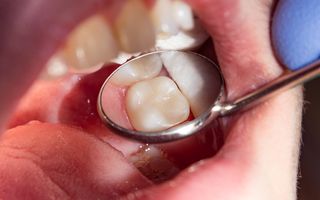
Dental fillings are the best way to treat cavities in your teeth. It’s a quick and simple procedure that you can have done on your lunch break.
Not only will a filling improve your oral health and avoid further damage to your teeth, it will also avoid any further pain or discomfort caused by the cavity, allowing you to enjoy a healthier, happier smile.
More than 90% of Australians have experienced decay in their permanent teeth, making dental fillings one of the most common dental procedures in the country.
What are dental fillings?
When you have a cavity in your tooth, it means there is a hole in the centre of that tooth. These holes are bad for several reasons.
Cavities can expose the nerves in your teeth, which can cause anything from minor discomfort due to greater sensitivity to hot and cold food and drink, to significant pain due to nerve damage. Additionally, if the nerve dies, you will likely need a larger procedure to treat the tooth, such as a root canal.

Cavities can also weaken the tooth itself, which can lead to further chipping, cracks, and damage.
For these reasons, the hole will need to be cleaned and filled with a ‘filling’ to avoid pain, discomfort, and further damage to the tooth and your overall oral health. These fillings are usually made from a material called ‘amalgam’, but can also be made from composite resin, gold, or porcelain (more on these materials below).
Your dentist will suggest the best option for your teeth - it usually depends on the placement of the tooth that needs a filling - and you can decide on the best filling material together.
The advantages of dental fillings
Dental fillings are a popular option for the following reasons:
- Prevent further damage and discomfort: A lot of dental discomfort and damage comes from cavities and dental decay, and a dental filling is a great way to stop the damage and treat the pain.
- Quick and easy: Dental fillings are extremely quick and easy. Most people will be in and out within 30 minutes, so it can be completed during a work break.
- Long-lasting: With good dental care, dental fillings will generally last for at least a decade. Fillings made from gold can last for even longer, for as much as 20 years or more.
How do dental fillings work?
Even if you think you have a cavity, your dentist will still want to book a check-up to inspect and confirm the issue. They will then book a second appointment to have the filling done.
Here is what to expect during your dental filling appointment:
- Your dentist will inject a local anaesthetic to completely numb the area
- They will use a special tool to remove the decay from the tooth
- They will fill the cavity
- They will shape and polish the tooth so it feels natural to bite onto
- The area will still feel numb for a few hours following the treatment
- The whole treatment will usually only take 20-30 minutes
- The site may feel a little tender for the next day, so avoid biting down on hard foods
- Your dentist will check on the filling during your next routine appointment
Tooth Decay in Adults and Children
Melbourne suffers, as much of the world does, from an incidence of tooth decay. Much of this is caused by the effect of sugar in the mouth. The best tooth decay treatment Richmond Fine Dentistry has to offer is prevention. Where preventative treatments are not possible our expert team can provide the fine care and tooth decay treatment Melbourne has to offer.
How do I know if I have tooth decay?
During routine appointments, dentists will check for tooth decay with a visual inspection and x-ray scans. They may discover tooth decay during this process.
However, for many people, the first signs of decay are found at home. Tooth decay often causes discomfort and pain, leading to an appointment with the dentist.
These are some of the signs that you've got tooth decay:
- Sensitivity when you eat hot, cold, or sugary food or drinks.
- An ache around a tooth.
- Pain when you bite down.
- A hole that you can feel with your tongue, or see when you look in a mirror.
- Black, brown, or white staining on a tooth.
What causes tooth decay?
- Medications that you may be taking that may have a drying effect in the mouth.
- Excessive intake of caffeine. Caffeine is found in coffee, tea, chocolate and cola drinks. It draws fluid from the body and reduces saliva.
- Working in a dry environment and not rehydrating often enough.
- Some specific diseases or conditions such as Sjogren’s syndrome.
In the mouth, there is a constant demineralisation (strengthening minerals like calcium and fluoride being dissolved by acids) and remineralisation (strengthening minerals being re-deposited on the teeth from saliva). If your demineralisation is happening at a greater rate than remineralisation, you get loss of tooth substance.
If your mouth is acidic a good deal of the day from, say, excessive and constant intake of acidic soft drinks or constant sugar intake, then the demineralisation wins and you have problems.
If you are careful with the diet, then your saliva is more neutral and you will get good remineralisation to constantly repair the teeth.
Stages of tooth decay
Early dental caries are reversible. Minerals can be deposited back onto the tooth surface if you can modify your diet and oral hygiene. Your dentist can treat early areas of caries with topical fluoride, and if you are careful with your diet and cleaning no other treatment may be required.
A more advanced area of dental caries will require a ‘filling’ or restoration. Your dentist will remove the damaged and infected soft tooth structure and repair the tooth. It is important to have this done as early as possible to preserve the strength of the tooth and prevent bacteria damaging the tooth pulp.
It is very important to listen to your dentist’s advice on how to eliminate the cause of your caries. Don’t think that just fixing a cavity will stop the disease from occurring in other areas of the mouth.
How to avoid tooth decay
While tooth fillings are a great option for treating tooth decay, it’s always best to avoid getting cavities in the first place. This means brushing for two minutes twice per day, flossing every day, and avoiding consuming lots of sugary food and drink. That’s because plaque and bacteria in your mouth can feed on sugars and build up on your teeth, where they erode the enamel and cause cavities and other damage.
- Being careful with how often you eat sugary foods or have sugary drinks.
- Brushing and flossing your teeth thoroughly to reduce the amount of bacteria on their surfaces.
- Using fluoride toothpaste. This will make the surfaces of teeth more resistant to acid. The fluoride in our water supply strengthens the developing teeth of infants and children.
Saliva is the best natural defence against decay. The acid from bacteria can be neutralised by saliva. A reduced flow of saliva (dry mouth) can increase your risk of decay. If you have a constant dry mouth, you should consult your dentist to find the cause.

Taking care of your teeth is crucial to your overall health, as there are links between oral health and heart disease, obesity, and diabetes.
- Rinse your mouth with water after having sugary food or drink.
- Have a small amount of cheese after sugary food or drink. This will help to neutralise the acid produced by oral bacteria.
- Using sugarless chewing gum may help protect your teeth by stimulating extra saliva. Saliva is very important in protecting your teeth from decay.
- Do not put any sugar or other sweeteners in your baby’s bottles.
- Remember the drying effect of excess caffeine.
- Remember that smoking changes the saliva to a more harmful consistency.
Whether you think you need a filling or would like a check-up to help avoid needing fillings in the future, get in touch with our friendly team to schedule an appointment.
Frequently asked questions
A tooth filling will vary in cost depending on a number of factors, including the placement of the tooth, which filling material you use, and how many fillings you get at once.
Dental fillings typically last 10-15 years if looked after correctly, but filling materials such as gold can last even longer.
Good dental care such as a healthy diet, regular flossing and brushing, and regular dentist check-ups will help to ensure the longevity of your filling.
No, tooth fillings don’t hurt because the area will be numbed with a local anaesthesia before the treatment even begins. The site may be a little tender for the following day after the procedure, but you can either take over-the-counter pain medication or avoid chewing using that tooth during this time.
The most painful part of a tooth filling is usually before you get it - the cavity itself can cause pain and discomfort, but the filling will treat the cause to avoid further pain.
No, a tooth filling is incredibly common, and most Australians will need at least one during their lifetime. You can get a tooth filling completed in less than an hour and not think about it again for many years to come.
The most common side effect of dental fillings are tenderness around the area following the treatment, which can be managed by over-the-counter pain medication. Other less common, side effects include:
- Infection that would need to be treated with antibiotics
- Dental fillings chipping or cracking over time
- Dental fillings falling out over time
Your dentist will watch for signs of damage to your filling over time, so regular check-ups will usually catch these problems before they occur.

